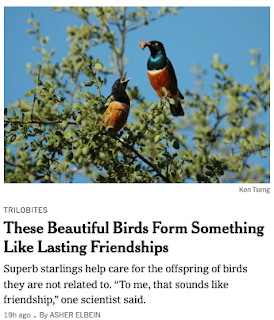A new long-term study of Superb Starlings in East Africa is underway. They have long been known to fly in flocks and congregate together on the ground. But a new study which looked at 27 years of data has found a new relationship.
It is always hard to humanize feelings in other animals, but these birds appear to make friendships. In the wild, these birds build nests in groupings - usually for safety. But the Superb Starlings will keep their groupings for extended periods. After chicks are hatched, many different birds will help feed the new chicks. (This is different from those damn Cuckoos who lay their eggs in other bird's nests.)
I am going to pull part of this from the New York Times Science because they explain it better than I can.
me
Dr. Rubenstein’s lab has maintained a 20-year field study of the species that included 40 breeding seasons. It has recorded thousands of interactions between hundreds of the chattering birds and collected DNA to examine their genetic relationships. When Dr. Earl, then a graduate student in the lab, began crunching the data, she and her colleagues weren’t shocked to see that birds largely helped relatives, the way an aunt or uncle may swoop in to babysit and give parents a break.
But to their surprise, they found that starlings also helped nonrelatives, including when they might have helped family instead. Birds new to the flock helped those born within it, and vice versa. And because superb starlings often switch between breeding and helping roles, the team found that individual birds that helped nonrelatives one breeding season later had their good deeds repaid, sometimes repeatedly.
“The starlings are consistently investing in the same preferred social partners over their lives,” Dr. Earl said. “To me, that sounds like friendship.”
The idea that animals might establish friendships with unrelated individuals has provoked controversy among scientists, said Gerald Carter, an animal behaviorist at Princeton University and an author on the paper. However, a growing body of research has led scientists to accept that long-term reciprocal relationships exist among primates, elephants, crows and whales. There are also vampire bats that share blood meals with unrelated, hungry colony members, and unrelated, male Lance-tailed manakins serve as “wingmen” for each other to gain female attention.
But long-term relationships can be difficult to detect, Dr. Rubenstein said. The team needed 27 seasons’ worth of data to pick up hints of reciprocity in the starlings. He thinks they’re still underestimating it.
Interesting how we keep learning more about other animals' inner lives.





No comments:
Post a Comment